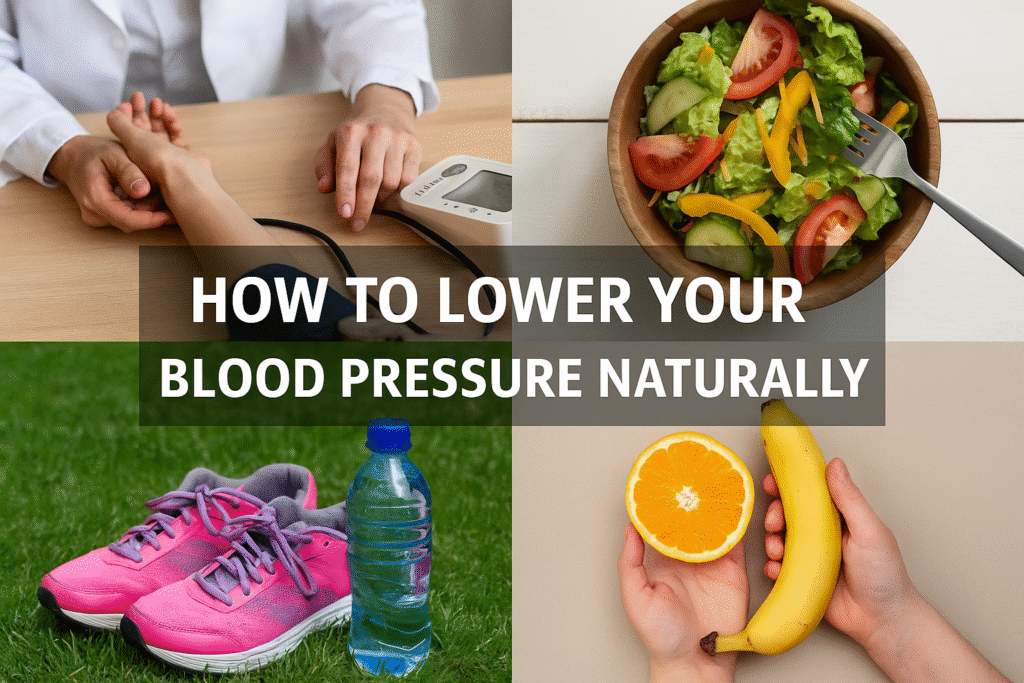High blood pressure, or hypertension, is one of the most common lifestyle-related health issues affecting people of all ages. It’s often called a “silent killer” because it usually has no symptoms, but quietly damages your heart, blood vessels, kidneys, and brain over time. Fortunately, there are several effective ways to lower your blood pressure naturally—without always relying on medications.
As a practicing Cardiologist in Baner, Pune, I’ve seen firsthand how simple changes in daily habits can make a huge difference. If you’ve been diagnosed with high blood pressure, or if you want to prevent it altogether, here are some natural and science-backed ways to manage and reduce it.
1. Cut Down on Salt (Sodium) Intake
Excess sodium causes your body to retain water, which increases blood pressure. The average Indian consumes more salt than needed—often without realizing it through packaged snacks, pickles, papads, and restaurant foods.
- Limit your sodium intake to less than 1,500 mg per day.
- Use herbs, lemon, or black pepper to flavor your food instead of salt.
- Avoid canned, processed, or ready-to-eat meals.
Tip: Read food labels and choose “low sodium” or “no added salt” versions when available.
2. Adopt the DASH Diet
The DASH (Dietary Approaches to Stop Hypertension) diet is specifically designed to help manage blood pressure. It emphasizes:
- Fruits and vegetables
- Whole grains
- Low-fat dairy
- Lean proteins (like fish, chicken, legumes)
- Nuts and seeds
At the same time, it reduces saturated fats, cholesterol, and added sugars.
Bonus: The DASH diet also supports weight loss, which in itself lowers blood pressure.
3. Exercise Regularly
Physical activity strengthens the heart, improves blood circulation, and helps your arteries stay flexible. Even 30 minutes of moderate exercise daily can significantly reduce your blood pressure.
Some easy ways to stay active:
- Brisk walking or jogging
- Cycling
- Swimming
- Dancing
- Yoga
Consistency is key. Don’t push for intensity—focus on daily movement.
4. Manage Stress Effectively
Chronic stress releases hormones that temporarily spike your blood pressure. If stress becomes a part of daily life, it can lead to long-term hypertension.
Here are a few natural stress management techniques:
- Deep breathing exercises
- Meditation or mindfulness
- Spending time in nature
- Journaling or reading
- Limiting screen time, especially news and social media
Remember: Emotional health directly impacts heart health.
5. Reduce Alcohol and Quit Smoking
Excessive alcohol can raise your blood pressure and damage your heart over time. Stick to the recommended limit—1 drink per day for women and 2 for men.
Smoking, even occasional use, causes your blood vessels to constrict and increases blood pressure immediately after each cigarette.
If you smoke, quitting is the single most powerful thing you can do for your heart.
6. Lose Extra Weight
Even a small amount of weight loss can have a noticeable effect on blood pressure. Belly fat, in particular, is linked to higher risk for hypertension and heart disease.
- Eat smaller portions
- Avoid sugary drinks and snacks
- Track your progress with a journal or app
As a Cardiologist in Pune, I often recommend combining a healthy diet with light exercise and lifestyle coaching to help patients achieve lasting weight loss results.
7. Get Quality Sleep
Poor or insufficient sleep is associated with high blood pressure and heart disease. Aim for 7-8 hours of uninterrupted sleep every night.
Tips to improve sleep quality:
- Keep a regular sleep schedule
- Avoid screens 1 hour before bed
- Create a dark, quiet, and cool sleeping environment
- Limit caffeine intake after 4 PM
If you snore or feel excessively tired during the day, speak to a doctor—conditions like sleep apnea can also affect blood pressure.
8. Increase Potassium-Rich Foods
Potassium helps balance out sodium levels in the body and eases tension in your blood vessels.
Include these potassium-rich foods in your diet:
- Bananas
- Oranges
- Potatoes
- Leafy greens
- Beans and lentils
- Yogurt
Always consult a doctor before increasing potassium if you have kidney issues.
9. Monitor Your Blood Pressure at Home
Home monitoring helps you track how your lifestyle changes are working and catch any early warning signs. Choose a good-quality digital blood pressure monitor and record your readings daily.
Note: Don’t panic over one high reading. It’s the trend over time that matters most.
10. Stay Consistent and Get Medical Advice When Needed
Lifestyle changes work best when done consistently. If your blood pressure remains high despite efforts, consult a specialist. You might need medication temporarily or long-term to protect your heart and organs.
As a trusted Cardiologist in Pune, I believe in a holistic approach—balancing natural remedies with medical guidance to help patients live healthier, longer lives.
Final Thoughts
Lowering your blood pressure naturally is entirely possible with the right combination of diet, exercise, sleep, and stress management. These lifestyle changes don’t just help with blood pressure—they improve your overall heart health, energy levels, and quality of life.
If you’re struggling to manage your blood pressure or want personalized advice, feel free to book a consultation with Dr. Tanmay Kulkarni, your trusted Heart Specialist in Pune.
Stay heart-healthy. Stay informed. Take control of your health—naturally.
📞 Book an Appointment: 8551913753
🌐 Visit Our Website: www.drtanmaykulkarni.com


 Select an element to maximize. Press ESC to cancel.
Select an element to maximize. Press ESC to cancel.